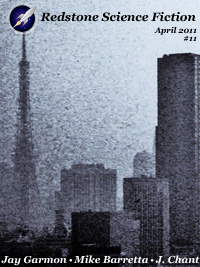 Redstone Science Fiction #11, April 2011
Redstone Science Fiction #11, April 2011
“Perfection” by Jay Garmon
“Brittlestar” by Mike Barretta
“Time’s Arrow” by J. Chant
Reviewed by Dave Truesdale
Jay Garmon‘s “Perfection” gives us a high-tech glimpse of the timeless dance surrounding sex and seduction–with a twist, as an “open source developer, dyed-in-the-wool copyleftist” whose software code is “shackled to no man’s patent,” meets his equally savvy female counterpart in a bar, at first glance a rather Plain Jane who, he discovers in short order, works for an IP enforcement firm―and is therefore a “mortal enemy.” He’s out to make (i.e. sleep with) this female mark with his personally rigged, state-of-the-art, aspect-enhancing “Spectacles”–trying to “read” what she wants―via sophisticated biofeedback and other programs–and giving it to her. Spectacles are the latest sophisticated tech-toy in the never-ending search for “perfection” in the art of meeting and seducing the opposite sex. But the tables are quickly turned when he finds himself sexually ensnared by her own Spectacles program. Yet this isn’t quite the end of this tightly-written snapshot of future seduction, for when the artificiality and pretense granted by their Spectacles falls away, they find a more classic version of “Perfection.” Short and sweet, and while not totally original (the conceptual groundwork for this type of story was laid by some of Bruce Sterling’s early short work), Garmon has done his homework particular to his story, and the desired point is cleanly made.
Mike Barretta‘s “Brittlestar,” I am sorry to say, is a total clunker. The storyline goes like this: a volcano has collapsed down Florida-way, causing tsunamis and vomiting all sorts of deep sea life to the surface. All but one species of creature has perished. One has survived―the Brittlestar. They are intelligent, malevolent, and are taking over mankind via parasitism. They turn some of us into “droolers,” mere hosts for their little, wiggly spawn-to-be, and others into “hyper-intelligent hybrids” who are naught but a recasting of the Pod People from Invasion of the Body Snatchers (they look like us, talk like us, but on the inside…). One of the Good Guys―our protagonist―parachutes from a plane with a nuke strapped to his chest, his mission to destroy the Brittlestar home base, or secret complex, or whatever. After some shoot’em-up scenes on his fall to earth with Brittlestar F-16s (his “smart” high-tech flight suit has mini-wasp missiles), he lands and finds his wife to be a hybrid. His weakness for her betrays his mission and he becomes a hybrid himself. It turns out the race of Brittlestars is building a ship to the stars so they won’t have to return to the ocean depths to live in the darkness, mud, and slime. As the space ship leaves Earth it is buffeted by the explosion of the nuke, which we learn our hybrid-Good Guy has indeed planted as per his original mission. Hybrid-love wins out over being just human, as our hybrid-protag enjoys his new heritage and looks forward to his new home.
Well. Played for campy space-opera laughs it might have worked if done intelligently, but this wasn’t. Played straight, it invoked too many cornball clichés (and more than a few stale metaphors). Add to this the writing itself, which was so amateurishly sub-par as to be embarrassing. Word choice, sentence structure, the whole ball of wax―embarrassingly first-draft amateurish. “Brittlestar” needed a severe rewrite before the editor should have considered it for publication in a professional SF magazine―or fanzine, or any other kind of zine.
If there is a flipside to this reading of the story it is this (if I’m not stretching things too far looking for any possible silver lining): due to the physical nature of the Brittlestars as described, and noting they came from the depths of the ocean, there might be a bit of HPL here; and there might be a subversion of one aspect of Invasion of the Body Snatchers in that our Hero willingly agrees to become a hybrid, as part of the Brittlestar group mind. If (and this is a Big If) these two flipside ifs were intended, the absolute crudity of the prose still killed any desired effect the story might have hoped for. Mighty Cthulhu’s writhing tentacles would shrivel and the invasion pods would gladly turn brown and die unburst truck-side in Santa Clara had they the wherewithal to read this one.
And then there’s the dropped words, incorrect punctuation, and the typos (which aren’t the author’s fault). Not good.
J. Chant’s “Time’s Arrow” fares better that “Brittlsestar,” but not by much. Very short at a few hundred words, it tells the tale of an alien smuggler on its way to Ganymede who has had to abandon ship and is now stranded in a shuttle, drifting along with no hope of rescue. Told via the alien’s thoughts (surprisingly human thoughts, with no hint of a true alien mindset), it muses on the nature of Time, its boundaries and its consequences, how there’s no going back, etc., etc.. The slight gimmick near the end (the smuggled cargo is a human) gives the tale its only passable interest. The whole is therefore most unremarkable in nature. There’s no depth at all to this vignette’s sophomoric philosophizing, which comprises the body of the story. And then there are the typos. Not good.
Aside from Jay Garmon’s “Perfection,” this was not a good month for Redstone Science Fiction.